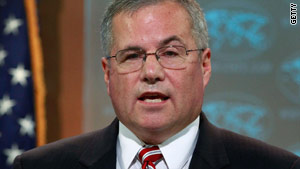Scammer
Banned

Washington -- Sudan parties must be ready to compromise in a new round of talks as the country's north and south regions prepare for a vote that could see them split into two, U.S. officials say.
"With just 79 days remaining until January 9th ... there is just no more time to waste," said Scott Gration, the U.S. special envoy for Sudan.
Next week's talks in Ethiopia will address remaining obstacles in the January 9th referendum, including the status of the disputed oil-rich Abyei district on the border of the north and the south.
The talks will include an African Union delegation led by former South African President Thabo Mbeki.
Earlier discussions between the two sides this month failed to bring compromise on key issues.
"With time running out, the parties must make a strategic commitment to work together to avoid war, to achieve a lasting peace," Gration said in Washington on Friday.
"The parties must be prepared to come to Addis with an attitude of compromise to reach a final agreement on these remaining tough issues. The entire world is watching and will make judgments based on how the parties approach these talks, on how they act in the next couple months."
Washington has called Sudan's referendum process a "ticking time bomb," and offered the African nation incentives, including possible easing of economic sanctions.
The January vote would allow the autonomous southern region -- which holds a majority of the nation's oil -- to secede from the north.
Fears that the process would cause more instability in the war-torn nation have sparked concerns among the international community.
"The referendum on self-determination ... must take place peacefully and on time," U.S. President Barack Obama told world leaders gathered at the United Nations last month.
"And the will of the people of southern Sudan and the region of Abyei must be respected regardless of the outcome."
The referendum was part of a 2005 peace agreement that ended two decades of violence between the north and the south. The conflict led to the deaths of 2 million people, many from starvation.
Currently, Omar al-Bashir is the president of Sudan, while Salva Kiir serves as the president of the southern region and the nation's vice president.
At stake in the referendum are Sudan's massive oil reserves, found mostly in the south, but still controlled by the government in the north.
